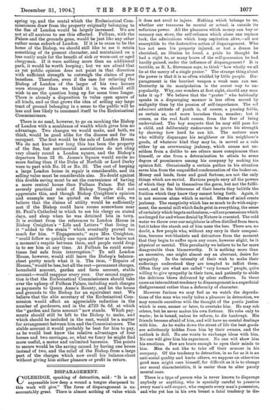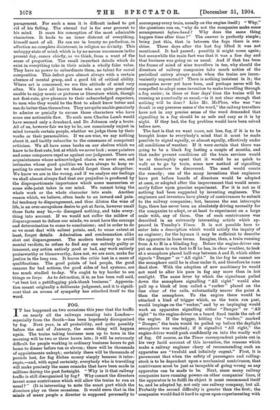it does not avail to injure. Nothing which belongs to
us, whether our treasures be mental or actual, is outside its nefarious power. All the pleasures which money can buy or memory can store, the self-reliance which alone can replace luck, the admirations which keep aspiration alive,—all are susceptible to the destructive action of disparagement. Who has not seen his property injured, or lost a dream he cherished, an illusion he loved, a pride he thought he had a right to, or many hours of the self-possession he had hardly gained, under the influence of disparagement? It is terrible, as R. L. Stevenson says, to think "how wholly we all lie at the mercy of a single prater." The strange thing about the power is that it is so often wielded by little .people. Dis- paragement is the heaviest weapon a weak man can use. Dexterity in it manipulation is the surest way to un- popularity. Why, one wonders at first sight, should any man take it up ? We believe that the " prater " who habitually speaks in a disparaging manner is less often moved by malignity than by the passion of self-importance. The nil adinivari attitude of youth is, of course, a passing foible, as certain as, and more harmless than, measles; but it comes, as the real fault comes, from the fear of being undervalued. The boy suspects that he may still pass for a child, and deliberately endeavours to prove his strength by showing how hard he can hit. The mature man who wilfully disparages his neighbour or his neighbour's goods, of whatever kind they may be, is moved as a rule either by an overweening jealousy, which comes not un- seldom from a dislike to see others more conspicuous than himself, or else from a determination to attain to some degree of prominence among his company by making his opinion felt. Occasionally a certain pathos in his situation saves him from the unqualified condemnation of the looker-on. Money and lands, fame and good fortune, are not the only things which are envied. Envious people envy all the powers of which they feel in themselves the germ, but not the fulfil- ment, and in the bitterness of their hearts they belittle the fruition which they know they cannot bring forth. Again, it is not success alone which is envied. States of mind create jealousy. The receptivity which has so much to do with enjoy- ment, the mental mill which finds grist in everything, the sense of certainty which begets enthusiasm,—all are possessions which are longed for and whose denial by Nature is resented. The cold water we throw over our neighbour is often distilled from tears, but it takes the starch out of him none the less. There are, no doubt, a few people who, without any envy in their composi- tion, become wet-blankets and detractors from the moment that they begin to suffer upon any score, however slight, be it physical or mental. This peculiarity we believe to be far more disagreeable than blameworthy. It is nothing more than an excessive, one might almost say an aberrant, desire for sympathy. In the intensity of their wish to make their sufferings understood they are tempted to inflict them. Often they are what are called "very human" people, quite willing to give sympathy in their turn, and patiently to abide the delirious blows delivered by other sufferers. In these cases an intermittent tendency to disparagement is a superficial disfigurement rather than a deformity of character.
However furious we may feel as we watch the depreda- tions of the man who really takes a pleasure in detraction, we may console ourselves with the thought of the poetic justice which is sure, sooner or later, to overtake him. He may rob others, but he never makes his own fortune. He robs only to waste ; he is bound, unless be reform, to die bankrupt. His friends become afraid of him, and will have no mental dealings with him. As he walks down the street of life the best goods are solicitously hidden from him by their owners, and the outlook is dull. No one wants to exchange ideas with him. No one will give him his experience. No one will show him his emotions. Few are brave enough to open their minds to him. Men do not like to take off their armour in his company. Of the tendency to detraction, in so far as it is an anti-social quality and hurts others, we suppose an otherwise good man might cure himself, for difficult as it is to change our moral characteristics, it is easier than to alter purely mental ones.
There is a type of person who is never known to disparage anybody or anything, who is specially careful to preserve every man's self-respect, who respects every man's possession, and who yet has in his own breast a fatal tendency to die. paragement. For such a man it is difficult indeed to get rid of his failing. The eternal but is for ever present to his mind. It mars his conception of the most admirable characters. It leads to an inner distrust of everything, himself most of all. He can see in beauty no perfection, in affection no complete disinterest, in religion no divinity. This unhappy state of mind, which is by no means uncommon in the present day, comes chiefly, as we think, from a want of the sense of proportion. The small imperfect details which do exist in everything take in their minds a wholly false value. They have no power to subordinate them, no talent for moral composition. This defect goes almost always with a certain absence of mental grasp, and a good bit of critical ability. Where art is concerned, we see this attitude of mind very often. We have all known those who are quite genuinely unable to enjoy music or pictures or literature which, though not first-rate, give pleasure to their acknowledged superiors, to men who they would be the first to admit know better and can do better than themselves. They are quite unable genuinely to admire or genially to excuse those characters who have some one noticeable flaw. To such men Charles Lamb would have seemed only a drunkard, and Dr. Johnson only a brute.
All of us, however fair we try to be, are consciously unjust in mind towards certain people, whether we judge them by their works or their personalities. If we are wise, we say nothing about it, and tacitly subscribe to the consensus of competent criticism. We all have some books on our shelves which we know to be first-rate, but at which we never look ; some painters and some composers repel us against our judgment. There are acquaintances whose acknowledged charm we never see, and intimates whose good qualities we have always to keep re- peating to ourselves lest we should forget them altogether.
We know we are in the wrong, and if we analyse our feelings we shall almost always find that our prejudice is produced by the disproportionate importance which some mannerism or some side-point takes in our mind. We cannot bring the whole work or the whole character into scale. Another reason which, we believe, often leads to an inward and pain- ful tendency to disparagement, and thus dilutes the wine of life, is an over-scrupulous desire to get at facts, however small those facts may be,—to disregard nothing, and take every- thing into account. If we would not suffer the mildew of disparagement to deface our minds, we must have the courage and determination to come to conclusions; and in order to do so we must deal with salient points, and, to some extent at least, forget details. Admiration and condemnation alike shut out disparagement. The modern tendency to avoid mental verdicts, to refuse to find any one entirely guilty or innocent, any action entirely good or bad, any work entirely praiseworthy or blameworthy, does not, we are sure, make for justice in the long run. It leaves the critic lost in a maze of qualifications. The good points of bad people, the good reasons for bad actions, the good sides of bad systems, are too much studied to-day. We ought to try harder to see things en large. As to detraction, it is, as has been well said, "at best but a pettifogging pick-thank business." Apprecia- tion meant originally a deliberate judgment, and it is signifi- cant that an aroma of sympathy has attached itself to the word.
FOG.



































 Previous page
Previous page